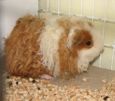Difference between revisions of "Guinea Pig Breeds - WikiNormals"
| Line 12: | Line 12: | ||
*In the UK The National Cavy Club promotes breed standards and encourages keeping, breeding and exhibiting. This can be found at; http://www.nationalcavyclub.co.uk/. | *In the UK The National Cavy Club promotes breed standards and encourages keeping, breeding and exhibiting. This can be found at; http://www.nationalcavyclub.co.uk/. | ||
| − | + | ==Abyssinian== | |
* The Abyssinian has a rough short coat defined by a symmetrical pattern of rosettes and ridges (similar to whorls in horses). The coat is often able to stand on end to accentuate the ridges. Variety of colours. | * The Abyssinian has a rough short coat defined by a symmetrical pattern of rosettes and ridges (similar to whorls in horses). The coat is often able to stand on end to accentuate the ridges. Variety of colours. | ||
<gallery widths="115px" perrow="5"> | <gallery widths="115px" perrow="5"> | ||
Revision as of 07:42, 27 August 2010
|
|
Introduction
The breeds described below have been derived from the 'American Cavy Breeders Association' which provided the most comprehensive list of breeds. Please see http://www.acbaonline.com/breeds.html for further information.
- To make the process of breed identification easier, each breed has several examples and includes a small narrative of the breed characteristics. The various colours and their descriptions can also be found at the bottom of the page.
- In the UK The National Cavy Club promotes breed standards and encourages keeping, breeding and exhibiting. This can be found at; http://www.nationalcavyclub.co.uk/.
Abyssinian
- The Abyssinian has a rough short coat defined by a symmetrical pattern of rosettes and ridges (similar to whorls in horses). The coat is often able to stand on end to accentuate the ridges. Variety of colours.
Abyssinian Satin
- Same as above except rough feeling coat has a more satin feel and is generally softer.
Crested
- Short haired smooth coat with a distinctive crest in a different colour to that of the body. A self-colour with a white crest and no other white marks on the body is usually referred to as "White Crested". Therefore types of guinea pig with white body markings cannot usually be classed as Crested. Various self-colours and various crest colours.
Coronet
- Usually have a long, dense coat and a crest/coronet on top of the head. Various colours.
Peruvian
- Most have continuously growing long hair that can reach up to 50cm. They usually have a top and under coat. Most also have a frontal hair sweep which can completely cover the head. Various colours.
Peruvian Satin
- Same as above but softer more shiney coat.
Rex
- Coat stands on end in a similar fashion to the Teddy (see below) but the hair length is shorter, approximately 1cm. Various colours.
Short Haired
- Often also called "English" or "American". Has a smooth, consistently short coat and is sleek with a Roman nose. The hair does not usually have a parting. Variety of colours.
Short Haired Satin
- Same as above except that coat has a softer, satin finish.
Silkie
- Also referred to as "Sheltie". Has long hair that flows backwards and never covers the head (as in Peruvian). Rear facing hairs are generally longer in Silkies than Peruvians. There is also no parting along the back in Silkies. Various colours.
Silkie Satin
- Same as above but with a softer satin coat.
Teddy
- Coat should be a consistent length and hairs should be kinked so that they appear to stand on end. Coat should be resiliant and return to upright position immediately after being disturbed. Medium body length and Roman nose. Various colours.
Teddy Satin
- Same as above but with softer satin coat.
Texel
- The Texel is similar to the Silkie but with ringlets or curls. The curls are found throughout the coat including the belly. Texels do have a central parting. They have a broad well rounded head. Various colours.
Other
- Below are a few examples of currently uncommon breeds that are increasing in popularity.
Skinny Pig
- Almost hairless with a small amount on the muzzle and legs.
Ridgeback
- Smooth coated and a ridge of hair running along the back.
Colours
- Below is a brief overview of the common colours and names of guinea pigs but is by no means all possible colours.
Self
Any Solid colour including black, white, red, beige, chocolate, cream lilac and blue.
Dutch
Coloured head, often with a white blaze. Usually the front half of the body is white whilst the rear half is the same colour as the head.
Brindle
Usually a mixture of two colours, one dark and one light appearing in consistent areas over the body.
Tortoiseshell
Usually large well defined patches of red and black. Distributed evenly and uniformly over the body with defined edges.
Tortoiseshell & White
As per Tortoiseshell but also includes patches of white. Non-white colours usually alternate on either side of the back.
Roan
Darker hairs mixed with lighter hairs. Usually described by the base colour, for example Red Roan or Black Roan.
Agouti
Each individual strand of hair has a lighter and darker segment. Mainly gives either a golden or silver appearance.
Albino
White coat with red eyes. Can also be referred to by colour of eyes such as, Red Eyed White, or as Self.
Dalmatian
White coat with darker spots.
Himalayan
White or cream body with black or brown points, including nose, ears, feet and eyes.












































